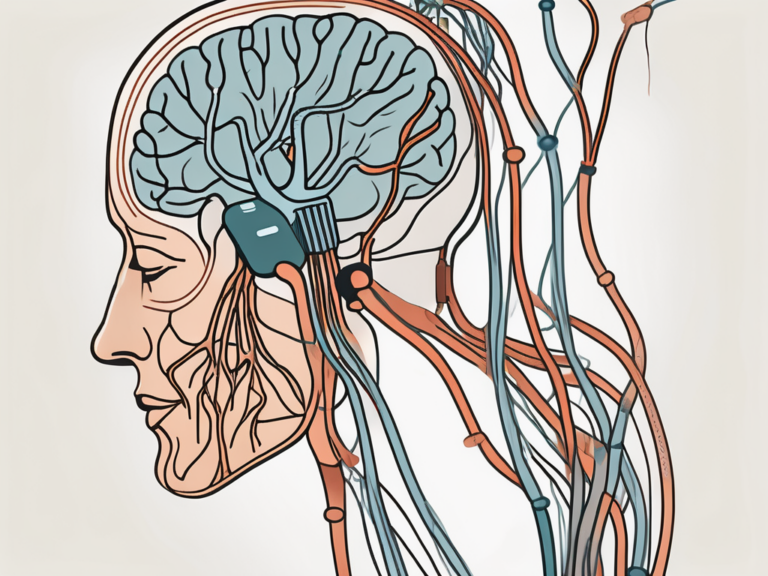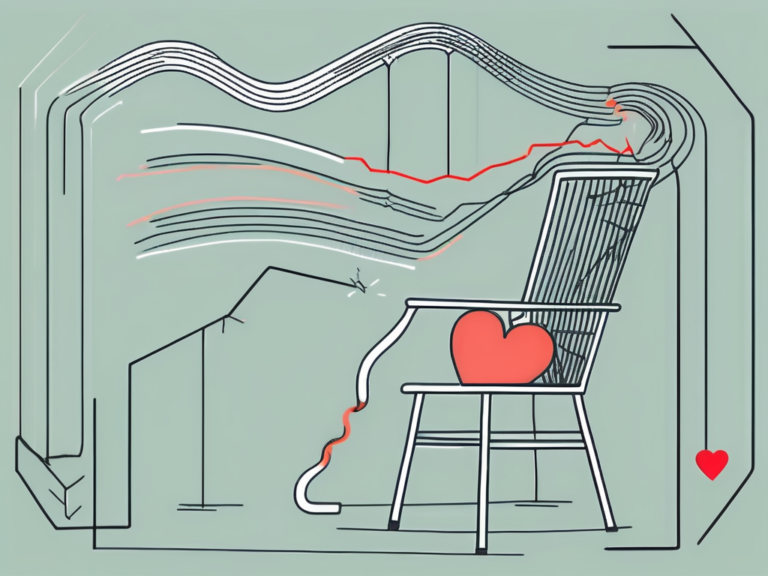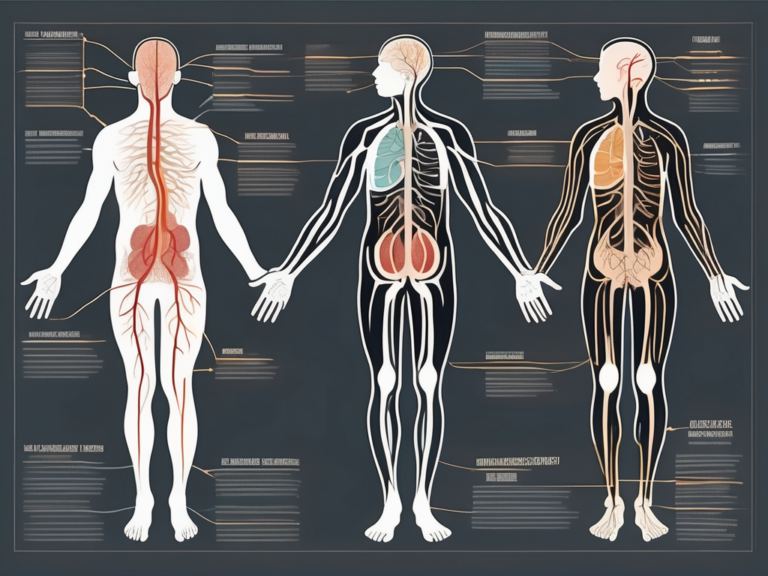The Importance of the Vestibular Nerve: A Comprehensive Guide
The vestibular nerve plays a crucial role in our everyday lives, yet many are unaware of its significance. In this comprehensive guide, we aim to shed light on the importance of the vestibular nerve and its impact on our overall well-being. Understanding this intricate system can greatly enhance our understanding of balance, spatial orientation, and even mental health.
Understanding the Vestibular Nerve
At its core, the vestibular nerve is a key component of the vestibular system, which is responsible for maintaining our balance and spatial awareness. By sending signals from the inner ear to the brain, the vestibular nerve helps us navigate our surroundings with precision and ease.
The vestibular nerve plays a crucial role in our daily activities, from simple tasks like walking and standing to more complex movements like dancing or playing sports. It is a silent hero, working tirelessly behind the scenes to ensure our equilibrium remains intact.
Anatomy of the Vestibular Nerve
The vestibular nerve is one of the two branches of the eighth cranial nerve, along with the cochlear nerve. It consists of a bundle of sensory nerve fibers that originate in the vestibular ganglion, located inside the inner ear. From there, the nerve extends into the brainstem, where it connects with various regions responsible for processing balance and spatial information.
Within the vestibular ganglion, specialized cells called hair cells detect the movement of tiny calcium carbonate crystals, known as otoliths, in the utricle and saccule. These movements are converted into electrical signals that are then transmitted through the vestibular nerve to the brainstem.
Function of the Vestibular Nerve
The primary function of the vestibular nerve is to transmit sensory information from the vestibular organs in the inner ear to the brain. These vestibular organs, known as the utricle, saccule, and semicircular canals, provide the brain with vital information regarding the position and movement of our head.
By relaying this information, the vestibular nerve enables the brain to generate precise motor responses, allowing us to maintain balance and adjust our body posture accordingly. Without the vestibular nerve, our ability to navigate the world around us would be greatly compromised.
In addition to its role in balance, the vestibular nerve also contributes to other essential functions such as eye movement coordination and spatial orientation. This intricate network of connections between the inner ear and the brain highlights the remarkable complexity of the human body’s sensory systems.
The Role of the Vestibular Nerve in Balance and Spatial Orientation
Balance and spatial orientation are essential for our daily activities. The vestibular nerve plays a pivotal role in these processes, ensuring that we can move confidently and accurately within our environment.
The vestibular nerve, also known as the eighth cranial nerve or the vestibulocochlear nerve, is a crucial component of the vestibular system. This system includes the inner ear and brain structures that help control balance and eye movements. The vestibular nerve carries sensory information from the semicircular canals of the inner ear to the brain, allowing for the perception of motion and spatial orientation.
The Vestibular System and Equilibrium
Equilibrium is the state of being in balance. The vestibular system, in collaboration with other sensory systems, helps us achieve and maintain equilibrium. When the head moves or changes position, the vestibular nerve quickly relays this information to the brain, which then initiates the appropriate muscular responses to keep us steady. Without the continuous input from the vestibular nerve, even simple tasks such as walking or standing up would become challenging.
In addition to maintaining balance during static and dynamic activities, the vestibular system also contributes to our sense of spatial orientation. This intricate system not only detects linear and angular acceleration but also helps us perceive our body’s position in space relative to gravity. This information is vital for coordinating movements and adjusting body positions to interact effectively with the environment.
The Vestibular Nerve and Spatial Awareness
Spatial awareness refers to our perception of the spatial relationships between objects and ourselves. The vestibular nerve is essential for this perception, as it provides the brain with critical information about the orientation and movement of our head in relation to our surroundings.
This constant stream of sensory data helps us navigate through crowded areas, judge distances, and maintain a stable visual field. Without the vestibular nerve’s input, spatial awareness would be significantly impaired, leading to difficulties in tasks requiring accurate judgments of distance and position.
Vestibular Nerve Disorders
While the vestibular nerve is vital for our well-being, it is not immune to disorders that can affect its function. Vestibular nerve disorders can have a significant impact on an individual’s quality of life, making it crucial to recognize the symptoms and seek appropriate medical attention.
Symptoms of Vestibular Nerve Disorders
Vestibular nerve disorders often manifest as dizziness, vertigo, and imbalance. Individuals may experience a spinning sensation, difficulty maintaining balance, and even nausea or vomiting. Other common symptoms include sensitivity to changes in head position, blurry vision, and a general feeling of unsteadiness.
It is important not to self-diagnose, as these symptoms can be indicative of other underlying conditions. Consulting a healthcare professional can help determine the root cause and develop an appropriate treatment plan.
Common Vestibular Nerve Disorders
There are several vestibular nerve disorders that individuals may encounter. One such disorder is vestibular neuritis, which is characterized by inflammation of the vestibular nerve. This inflammation can be caused by viral infections, leading to sudden and severe vertigo that can last for days or even weeks. Along with vertigo, individuals with vestibular neuritis may also experience difficulty with balance and coordination.
Another condition, known as Meniere’s disease, involves recurrent episodes of vertigo and hearing loss. This disorder is thought to be caused by an abnormal buildup of fluid in the inner ear, leading to increased pressure and disruption of the vestibular nerve. In addition to vertigo and hearing loss, individuals with Meniere’s disease may also experience tinnitus, a ringing or buzzing sound in the ears, and a feeling of fullness in the affected ear.
Benign paroxysmal positional vertigo (BPPV) is another common disorder that affects the vestibular nerve. It causes intense but brief episodes of vertigo triggered by specific head movements, such as rolling over in bed or tilting the head back. BPPV occurs when tiny calcium crystals in the inner ear become dislodged and float into the wrong part of the ear, disrupting the normal flow of fluid and causing dizziness. While BPPV can be unsettling, it is not typically a sign of a serious underlying condition and can often be successfully treated with specific head and body movements to reposition the crystals.
These disorders highlight the complex nature of the vestibular nerve and the importance of seeking appropriate medical intervention for accurate diagnosis and treatment. If you are experiencing any symptoms of vestibular nerve disorders, it is essential to consult a healthcare professional who specializes in disorders of the ear, nose, and throat, known as an otolaryngologist. They can conduct a thorough evaluation, including a physical examination and possibly additional tests, to determine the cause of your symptoms and develop an individualized treatment plan to help you regain your balance and improve your quality of life.
Diagnosis and Treatment of Vestibular Nerve Disorders
Accurate diagnosis and timely treatment are essential when dealing with vestibular nerve disorders. Medical professionals employ various diagnostic procedures to pinpoint the underlying cause and develop an effective treatment plan.
Understanding the intricate workings of the vestibular system is crucial in diagnosing and treating vestibular nerve disorders. The vestibular system, located in the inner ear, is responsible for maintaining balance and spatial orientation. When this system is disrupted due to issues with the vestibular nerve, symptoms such as vertigo, dizziness, and imbalance can occur, significantly impacting an individual’s quality of life.
Diagnostic Procedures for Vestibular Disorders
Diagnostic procedures for vestibular disorders may include a detailed medical history review, physical examination, and specialized tests such as electronystagmography (ENG) or videonystagmography (VNG). These tests assess eye movements and help identify any abnormalities in the vestibular nerve function.
Additionally, advanced imaging techniques like magnetic resonance imaging (MRI) may be utilized to rule out other potential causes of vestibular symptoms, such as tumors or structural abnormalities in the inner ear. Collaborating with a multidisciplinary team of specialists, including otolaryngologists and neurologists, can further enhance the diagnostic process, ensuring a comprehensive evaluation of the patient’s condition.
Treatment Options for Vestibular Disorders
The treatment of vestibular nerve disorders depends on the specific condition and its severity. Medications, such as vestibular suppressants or anti-nausea drugs, may be prescribed to alleviate symptoms. Physical therapy can also play a crucial role in vestibular rehabilitation, helping patients improve balance, reduce dizziness, and regain confidence in daily activities.
Furthermore, lifestyle modifications, including dietary changes and stress management techniques, may complement medical interventions in managing vestibular disorders. Patient education and counseling are essential components of treatment, empowering individuals to actively participate in their recovery process and adhere to prescribed therapies.
In some cases, surgery may be considered if conservative treatments do not yield satisfactory results. However, it is essential to remember that treatment decisions should always be made by healthcare professionals based on individual circumstances, and self-medication or self-treatment is strongly discouraged.
The Impact of Vestibular Nerve Health on Quality of Life
Vestibular nerve health has a profound impact on an individual’s overall quality of life. Beyond physical well-being, it can also affect mental health and performance in various activities.
Understanding the intricate connection between the vestibular nerve and the brain is crucial in comprehending the far-reaching consequences of its health. The vestibular nerve plays a vital role in transmitting sensory information related to balance and spatial orientation to the brain. Any disruption in this pathway can result in a cascade of effects, influencing not only physical stability but also cognitive functions.
Vestibular Disorders and Mental Health
Living with a vestibular nerve disorder can be emotionally challenging. Constant dizziness and vertigo can lead to anxiety, depression, and a reduced ability to engage in social activities. Seeking support from healthcare professionals and engaging in therapy can help individuals manage their mental health while coping with the impact of vestibular disorders.
Furthermore, the psychological impact of vestibular disorders extends beyond the individual, affecting their relationships and daily interactions. Loved ones and caregivers may also experience emotional strain as they navigate the complexities of supporting someone with a vestibular condition. Open communication and education about these disorders are essential in fostering understanding and empathy within personal circles.
The Vestibular Nerve and Physical Performance
Physical performance, including sports performance, can be significantly affected by vestibular nerve disorders. The ability to maintain balance and accurately perceive spatial relationships is paramount in activities such as dance, gymnastics, and martial arts. Rehabilitation programs tailored to each individual’s needs can help regain physical performance and confidence.
Moreover, the impact of vestibular health on physical performance goes beyond structured activities and sports. Simple daily tasks such as walking on uneven surfaces, climbing stairs, or driving a car can become daunting challenges for individuals with compromised vestibular function. Occupational therapists play a crucial role in helping individuals develop strategies to navigate these obstacles and regain independence in their daily lives.
Maintaining Vestibular Nerve Health
While some vestibular nerve disorders cannot be prevented, there are steps individuals can take to maintain their overall vestibular health and reduce the risk of certain conditions.
The vestibular nerve, also known as the eighth cranial nerve, plays a crucial role in transmitting sensory information from the inner ear to the brain, helping us maintain balance and spatial orientation. By prioritizing vestibular health, individuals can enhance their quality of life and reduce the impact of vestibular disorders.
Preventive Measures for Vestibular Health
Maintaining a healthy lifestyle that includes regular exercise, a balanced diet, and adequate hydration can positively impact vestibular nerve health. Engaging in activities that challenge balance, such as yoga or tai chi, can also help strengthen the vestibular system. Additionally, avoiding excessive exposure to loud noises and protecting the ears from injury can contribute to overall vestibular well-being.
Rehabilitation Techniques for the Vestibular System
In addition to preventive measures, there are rehabilitation techniques that can help improve vestibular function. Vestibular rehabilitation therapy, conducted by trained professionals such as physical therapists or audiologists, includes exercises aimed at promoting vestibular adaptation, improving balance, and reducing symptoms of dizziness or vertigo.
These exercises may include head movements, eye exercises, and balance training to stimulate the vestibular system and enhance its function. It is crucial to consult healthcare professionals before attempting any self-directed exercises to ensure safety and effectiveness. By incorporating preventive measures and rehabilitation techniques into their routine, individuals can support their vestibular health and overall well-being.
Conclusion
In conclusion, the vestibular nerve plays a vital role in our everyday lives, affecting our balance, spatial orientation, and overall well-being. Understanding the complexities of this nerve is crucial for recognizing and addressing vestibular nerve disorders. By seeking medical attention, following appropriate diagnostic procedures, and considering various treatment options, individuals can regain their vestibular health and improve their quality of life. Additionally, taking preventive measures and exploring rehabilitation techniques can help maintain vestibular nerve health and minimize the risk of developing certain conditions. Remember, always consult healthcare professionals for accurate diagnosis and treatment recommendations.






